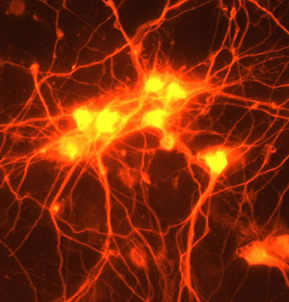 Jumbled Neurons
Jumbled Neurons The dictionary defines a victim as "an individual injured or killed (as by disease, violence, or disaster)", while a survivor "remains alive or in existence to persevere despite hardships or trauma."
The main difference I can see is that the survivor lives to persevere, as the definition says-- but the victim may die or live, is all. In my case, I survived a stroke and was not a victim, by the fact that I did not die. It seems we are splitting hairs here, because in many ways a lot of me has died. So that begs the questions, what qualifies being alive, and what is merely existing?
By the mere token that I was lucky to be alive, I would have to say that in the early days after my stroke, I was just existing. My body had totally shut down and withdrawn, and for 3 weeks I couldn't recognize anybody, and then one day I saw Chris. She was there by my side asking me questions, and saying that everything would be all right. Survival conversation. That's when I realized I had brain damage because my thoughts were jumbled, such as when I tried to say "no", it came out, "yes." Up meant down, and on meant off. I was all turned around and upside down.
I could not follow the simplest directions like the ones needed to play the simple card game of Fish. I was always asking Chris to repeat the rules, and when she re-explained I did not have a clue what she meant. Later, I learned my confusion was caused by a disorder called aphasia which is a loss of the ability to understand or express speech, usually caused by brain damage. I could not speak and I could not understand what was being said. Talk about a one-way conversation.
The doctors were thinking differently from my wife, since I had experienced such a massive hemorrhagic stroke, they thought I was mighty lucky to have survived. There is that word again – lucky. I will scurry back to the dictionary for a meaning that can apply. It means "success or failure apparently brought by chance rather than through one's own actions." Well, that does not accurately apply to me because I'm sure I could've done some things differently, monitored my medication better and paid closer attention to my body to prevent failure. I must have missed some warning signs, but I never would have dreamed that these insidious things would happen to me, where the right half of my body was nearly paralyzed. I think I will change that word to fortunate. I was fortunate not to have died.
More than anything I feel guilty and embarrassed that I put my friends and family through all the complications of recuperation and the process of recovery, however slow. My ordeal has been a huge inconvenience to everybody concerned. The worst thing is people feeling sorry for me because of how cumbersome my walking appears, how unbalanced and precarious, as if I could fall at any moment.
And I can fall, but I am aware of that possibility and take precautions against this common predator among stroke survivors. In fact, falling contributes to other injuries that can lead to the decline of one's health, such as a broken hip or clavicle, head injury, dislocated shoulder or busted elbow, making recovery that much more difficult and very disheartening. I'm doing my best to keep an even keel.
 RSS Feed
RSS Feed
